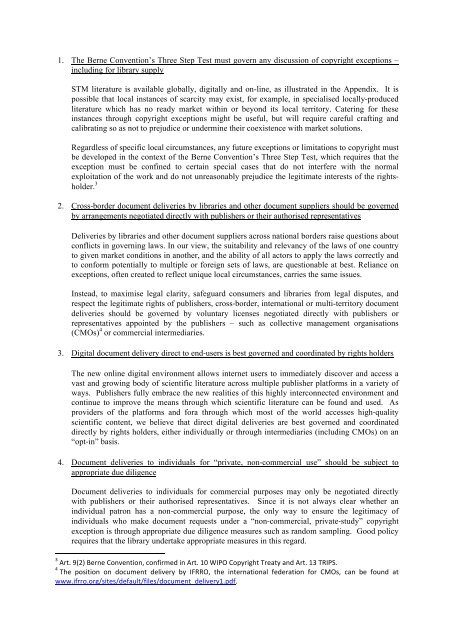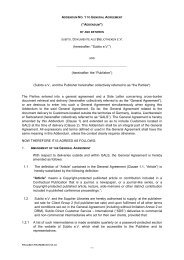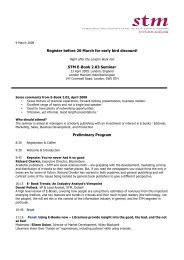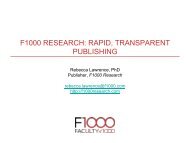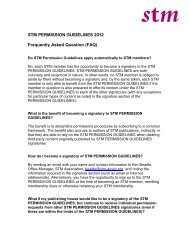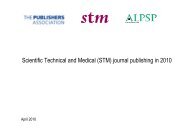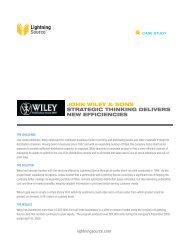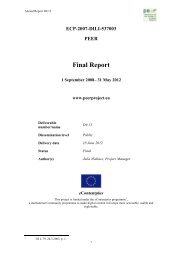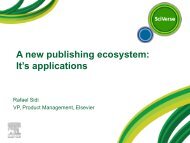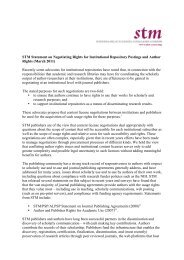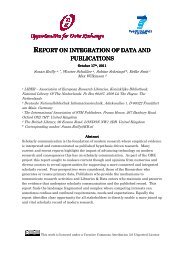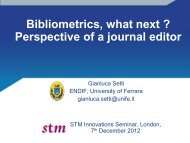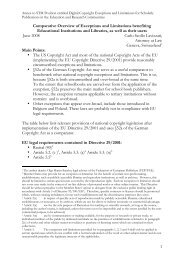STM Statement on Document Delivery 4th July 2013
STM Statement on Document Delivery 4th July 2013
STM Statement on Document Delivery 4th July 2013
Create successful ePaper yourself
Turn your PDF publications into a flip-book with our unique Google optimized e-Paper software.
1. The Berne C<strong>on</strong>venti<strong>on</strong>’s Three Step Test must govern any discussi<strong>on</strong> of copyright excepti<strong>on</strong>s –<br />
including for library supply<br />
<str<strong>on</strong>g>STM</str<strong>on</strong>g> literature is available globally, digitally and <strong>on</strong>-line, as illustrated in the Appendix. It is<br />
possible that local instances of scarcity may exist, for example, in specialised locally-‐produced<br />
literature which has no ready market within or bey<strong>on</strong>d its local territory. Catering for these<br />
instances through copyright excepti<strong>on</strong>s might be useful, but will require careful crafting and<br />
calibrating so as not to prejudice or undermine their coexistence with market soluti<strong>on</strong>s.<br />
Regardless of specific local circumstances, any future excepti<strong>on</strong>s or limitati<strong>on</strong>s to copyright must<br />
be developed in the c<strong>on</strong>text of the Berne C<strong>on</strong>venti<strong>on</strong>’s Three Step Test, which requires that the<br />
excepti<strong>on</strong> must be c<strong>on</strong>fined to certain special cases that do not interfere with the normal<br />
exploitati<strong>on</strong> of the work and do not unreas<strong>on</strong>ably prejudice the legitimate interests of the rights-holder.<br />
3<br />
2. Cross-‐border document deliveries by libraries and other document suppliers should be governed<br />
by arrangements negotiated directly with publishers or their authorised representatives<br />
Deliveries by libraries and other document suppliers across nati<strong>on</strong>al borders raise questi<strong>on</strong>s about<br />
c<strong>on</strong>flicts in governing laws. In our view, the suitability and relevancy of the laws of <strong>on</strong>e country<br />
to given market c<strong>on</strong>diti<strong>on</strong>s in another, and the ability of all actors to apply the laws correctly and<br />
to c<strong>on</strong>form potentially to multiple or foreign sets of laws, are questi<strong>on</strong>able at best. Reliance <strong>on</strong><br />
excepti<strong>on</strong>s, often created to reflect unique local circumstances, carries the same issues.<br />
Instead, to maximise legal clarity, safeguard c<strong>on</strong>sumers and libraries from legal disputes, and<br />
respect the legitimate rights of publishers, cross-‐border, internati<strong>on</strong>al or multi-territory document<br />
deliveries should be governed by voluntary licenses negotiated directly with publishers or<br />
representatives appointed by the publishers – such as collective management organisati<strong>on</strong>s<br />
(CMOs) 4 or commercial intermediaries.<br />
3. Digital document delivery direct to end-‐users is best governed and coordinated by rights holders<br />
The new <strong>on</strong>line digital envir<strong>on</strong>ment allows internet users to immediately discover and access a<br />
vast and growing body of scientific literature across multiple publisher platforms in a variety of<br />
ways. Publishers fully embrace the new realities of this highly interc<strong>on</strong>nected envir<strong>on</strong>ment and<br />
c<strong>on</strong>tinue to improve the means through which scientific literature can be found and used. As<br />
providers of the platforms and fora through which most of the world accesses high-‐quality<br />
scientific c<strong>on</strong>tent, we believe that direct digital deliveries are best governed and coordinated<br />
directly by rights holders, either individually or through intermediaries (including CMOs) <strong>on</strong> an<br />
“opt-‐in” basis.<br />
4. <strong>Document</strong> deliveries to individuals for “private, n<strong>on</strong>-‐commercial use” should be subject to<br />
appropriate due diligence<br />
<strong>Document</strong> deliveries to individuals for commercial purposes may <strong>on</strong>ly be negotiated directly<br />
with publishers or their authorised representatives. Since it is not always clear whether an<br />
individual patr<strong>on</strong> has a n<strong>on</strong>-‐commercial purpose, the <strong>on</strong>ly way to ensure the legitimacy of<br />
individuals who make document requests under a “n<strong>on</strong>-‐commercial, private-‐study” copyright<br />
excepti<strong>on</strong> is through appropriate due diligence measures such as random sampling. Good policy<br />
requires that the library undertake appropriate measures in this regard.<br />
3 Art. 9(2) Berne C<strong>on</strong>venti<strong>on</strong>, c<strong>on</strong>firmed in Art. 10 WIPO Copyright Treaty and Art. 13 TRIPS. <br />
4 The positi<strong>on</strong> <strong>on</strong> document delivery by IFRRO, the internati<strong>on</strong>al federati<strong>on</strong> for CMOs, can be found at <br />
www.ifrro.org/sites/default/files/document_delivery1.pdf.


